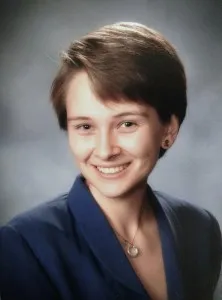Elowyn Corby '13 Wins Peace and Justice Studies Thesis Award

If you want to be heard, speak up. It's a basic concept that has driven the progression of democracy, the rise of cohesive communities, and now, Elowyn Corby's ['13] thesis research, which recently caught the attention of the Peace and Justice Studies Association (PJSA).
Titled "Training for Change: Moving from Theory to Practice in Adult Education for Empowerment," Corby's thesis garnered her the association's 2013 Undergraduate Student Thesis Award. Corby, a peace education and political science major with a minor in conflict studies from Santa Cruz, Calif., accepted the award and presented her work this past weekend at PJSA's annual meeting in Waterloo, Ontario.
Participation supports both the individual and the collective, according to Corby. It allows for the formation of social trust and social connection between people and within a society, and prevents communities from becoming too insular and controlling. However, participation has always been unevenly distributed.
"What we see is certain people getting heard a lot, often because they tend to participate a lot," she says. "The government listens to those who participate. My question was, how does education tie into this? We know we need democratic skills and participatory skills. How do we get there? Is that something that can be trained?"
Corby's hope was to determine whether activism training could reduce the inequalities that typically arise out of the most common way people develop activism skills: in the workplace.
"The experience that you accrue in the workplace is very biased along racial and socioeconomic lines," she explains. "So if you're developing leadership experience in the workplace, it's much more likely that you're a white male from a privileged socioeconomic background than you're a person of color, or a woman, from a working class background."
For her research, Corby chose to focus on Training for Change, an activism training organization that she had been in contact with since her freshman year at Swarthmore. Using them as a case study, she conducted 278 surveys and seven long-form interviews over the span of a year and a half.
"Statistically, Training for Change does increase [participants'] democratic confidence and how much they can engage in issues they care about across the board," Corby says. "They engage more frequently, they attend more meetings, they run more meetings."
However, Corby also stumbled upon a second discovery. Not only did Training for Change equalize the participatory playing field, it did so by exponentially increasing activism skills among people of color.
"Training for Change is not only increasing democratic participatory skills," she says, "but it's also doing it in a way that disproportionately affects communities that are much more likely to be silenced by our current democratic system. So it's combating larger social inequalities."
Corby's findings have solidified her staunch belief that anyone can become an activist, and hopes that her research can compel more people to consider the inequalities found in current activist participation in a new light. It's just a matter of channeling your passion and honing your skills.
"I think one of the things that holds activism training back is that it's not understood very well," she says. "It's not seen as something that's actually viable for facilitating and catalyzing social change. So there's a lot of need for activism training."
Corby credits her advisers, Associate Professor of Educational Studies Diane Anderson and Associate Professor of Sociology Lee Smithey, with providing support and encouragement. "Lee in particular spent hours and hours with me going over the data and number crunching," Corby says. "I feel strange taking credit for this because it was all of us."



